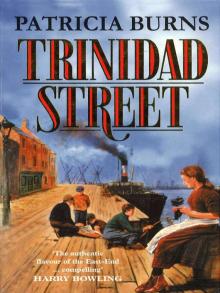- Home
- Patricia Burns
Packards Page 15
Packards Read online
Page 15
Daisy leant back in her seat, the palms of her hands hot and tingling. When Arthur asked if she was enjoying it, she was still so entranced that she said, ‘Oh yes, it’s wonderful!’ with wholehearted simplicity.
Arthur edged a little nearer. ‘I do like a girl who knows how to enjoy herself,’ he said. ‘You look so pretty when you laugh, do you know that? Knock spots off of any of them lot up on the stage.’ And he closed a hand tentatively over hers.
Daisy came to her senses. She snatched her hand away.
‘Watch it, mate.’
Arthur just grinned. It was all part of the game.
‘Fancy a drink, girls?’
Daisy said, ‘All right, then,’ at exactly the same moment as Isobel said, ‘No thank you.’ Daisy laughed.
‘Oh come on, Iz. Have a lemonade or something. You must be dry. I know I am, after all that singing.’
When Isobel realised that if she did not come she would be left sitting with just Johnny, she agreed. Their party joined the jostling crowd heading for the bar, Arthur taking the opportunity to steer her round obstacles and allow himself to be pushed up against her. Isobel caught hold of Daisy’s arm and put her lips to her ear.
‘Daisy,’ she whispered urgently, ‘I have to go to the er – conveniences. Won’t you come with me? Please?’
Daisy was torn. Female loyalty said that she ought to go along with her friend, but with Isobel out of the way in a place where Johnny could not possibly follow her, she might just get some of his attention at last.
‘You go,’ she said. ‘I’ll save your drink for you.’ And she hardened her heart to Isobel’s pleading expression.
When they reached the bar, she found that her strategy did not work. Johnny offered to buy the first round and left her with Arthur. Then when he came back with the full glasses, his first words to her were to ask whether she thought her friend was enjoying the evening.
‘Oh – I expect so,’ Daisy said.
‘I hope so. Only she doesn’t seem to be joining in at all. And she doesn’t find the comics very funny. In fact I don’t think she laughed once.’
‘Oh well, she’s a bit of the serious type, is Izzy.’
Come to think of it, Daisy didn’t think Isobel had much of a sense of humour, but she didn’t say so.
‘I like a girl who can enjoy herself,’ Arthur repeated. ‘Daisy’s enjoying herself, aren’t you?’
‘I love the halls,’ Daisy agreed. ‘Blooming good night out, it makes.’
‘I don’t think your friend does,’ Johnny said. He sounded very worried. ‘I mean, she’s used to better things, ain’t she?’
‘Blimey, mate, the Empire’s got the best music-hall acts in the country. You can’t get better than Clara Deare,’ Arthur protested.
‘I know, but some of those comics were a bit close to the mark, weren’t they? You don’t think she’s offended, do you?’
‘I thought they was good, and so did all of the other girls judging by the laughs,’ Daisy said.
‘Yeah but, well, we’re all like the same, aren’t we? She’s out of a higher drawer. Maybe we should’ve gone to a play or something.’
Daisy was getting impatient at all this. ‘Rubbish. Look at all that lot in the boxes with their bow ties and evening gowns and everything. They was enjoying it. Don’t you worry about Izzy. She’s just not the sort to bust her sides at anything. What did you like best? I bet it was that girl with the yellow dress – what’s her name, Annie Andrews? She looked just your type. Smashing voice.’
At last she got her way. Johnny stopped talking about Isobel and all three of them had a lively argument over the comparative talents of the artistes. Basking in the attention of both young men, Daisy almost forget about her friend.
After the horrors of the evening so far, Isobel found the queue for the ladies’ a welcome respite. One or two women tried to strike up a conversation with her, but when she ignored them they did not persist. She stood patiently in the line, grateful for the peace of her own company. She had known beforehand that she was going to hate it. She had held out for as long as she could, but after the two men had been so quick and effective in dealing with him – she could not bring herself to acknowledge her brother-in-law’s name – she knew that she was honour bound to give in to their request for an evening out with her and Daisy. And of course, there was Daisy herself. It was obvious that she was desperate for Isobel to accept and Isobel was very well aware of how much she owed to Daisy. But still it was hard. If her dear mama could see here now, at this vulgar place with those two common young men and not a responsible lady anywhere to chaperon her, she would have a fit of the hysterics, and her mama had not been a woman prone to the hysterics. But then, everything about her life now would cause her mama to throw up her hands in horror. It simply did not bear thinking about. Isobel could only hope that she could not see her from wherever heaven might be.
She managed to hang about in the ladies’ for almost the entire interval. It was not a pleasant place, crowded as it was with loud-voiced women wearing too much cheap scent in a vain attempt to smother the odours of their bodies, but it was preferable to finding her way to the bar and the company of the two men. As she stood washing her hands and tidying her hair amongst jostling women applying rouge and powder, she did consider walking out and taking a cab back to Trent Street. But the thought of what Daisy might say stopped her. No, she had to stay and endure to the end.
When she finally emerged she found that people were beginning to flood back to their places. Rather than swim against the tide of humanity, Isobel decided it would be best to meet the others in the circle rather than the bar. She was just finding the right set of stairs when she recognised a face in the crowd, a young gentleman in impeccable evening dress. Mr Peregrin Amberley Packard. She was so surprised that she found herself inclining her head towards him as a lady should do if she wishes to acknowledge a gentleman. She regretted it the moment she saw him bow in return and begin to work his way towards her. But the deed was done and she could only stand and wait for him. He was soon at her side.
‘Good evening. It’s Miss – er – from my sister’s department, is it not?’
She supposed she ought to address him as ‘sir’, but something inside her rebelled against it. She had been born and brought up a lady, whatever her present circumstances. She would behave as if they had been properly introduced by a mutual friend.
‘Miss Brand,’ she reminded him. ‘Good evening, Mr Packard.’
‘Of course, yes, Miss Brand. Forgive my forgetfulness.’
She could tell from the expression in his eyes that he was surprised at her manner and her accent, but he rode over it.
‘How very pleasant to run into you here, of all places. Are you enjoying the show?’
Isobel was at a loss as to how to answer this. Presumably he enjoyed this sort of thing, or he would not be here, but for the life of her, she could not pretend to like it herself.
‘It’s – er – very lively.’
Mr Peregrin Packard laughed. ‘In other words, you cannot stand it, eh? Am I right?’
Isobel looked down at her hands. ‘Er – well –’
‘Came with friends, did you? Persuaded you it would be a jolly night out?’
‘Something of the sort, yes.’ Isobel snatched at the chance to get away. ‘I – I must rejoin them now. G-Good evening, Mr Packard.’
‘And a very good evening to you, Miss Brand. It has been a pleasure to talk to you.’
He gave a very elegant little bow despite the crowd jostling past. Isobel, blushing, inclined her head in reply and went on her way, hardly knowing where she was going. It was sheer luck that brought her back to the right place for the second half.
The others were standing in the aisle looking anxious. It was Johnny Miller who spotted her first.
‘Isobel! There you are. We was getting worried about you. We was about to send out a search party.’
‘I – I’m sorry. I was delayed
,’ Isobel said, while inside she fumed. What made him think he could use her Christian name? Mr Packard had not done so. But then he was a gentleman.
She had hoped that there might be some change in the seating arrangements, but the young men seemed to have agreed amongst themselves that it was to be the same as before, and Isobel found that once more she was sitting with Daisy on one side and Johnny Miller on the other. She sat as far away from him as the cramped space allowed. Daisy leant her head over till it was almost touching Isobel’s.
‘You all right?’ she muttered.
‘Yes, yes perfectly, thank you,’ Isobel lied.
‘Only I wondered, you know, when you was so long.’
Dear Daisy.
‘There was a very long queue,’ Isobel said.
‘Ain’t it wonderful? Best night of my life, this is.’
‘I’m glad,’ Isobel said, and meant it. At least one of them was enjoying it.
The second half was, if anything, worse than the first. There were more women, with crudely made-up faces and skirts right up to their calves, singing sentimental or suggestive songs in corncrake voices. There were dancers who did high kicks and cartwheels which showed all their legs and most of their underwear, to the delight of the males in the audience. There was a strong man in a leopard skin that revealed his hairy chest and arms and even part of his thighs. When he flexed his muscles all the women squealed. But the worst by far were the comics in their loud jackets and baggy trousers and huge bright bow ties who said things that she did not even understand, but such was the tone of voice in which they said them that there was no mistaking their meaning. Certainly the audience understood, for they were in gales of raucous laughter. Beside her, Isobel could hear Daisy gasping for breath and saying, ‘Oo, just listen to him! The cheeky devil! Ain’t he a one?’
It made Isobel feel queasy with distaste, which in itself was bad enough. But far worse, under the queasiness there was an odd excitement, a stirring that brought back all the most terrible memories of her time at her sister’s house. They came to her in flashes, the images she had tried to suppress all these weeks. The first gentle looks of sympathy, the kind words and brotherly holding of her hand and patting of her shoulders, which slid almost imperceptibly into embraces and kisses. She should have stopped it before it began, but she had been so miserable, so bewildered by grief and the sudden reversal of her fortunes that she accepted the comfort. But then, before she knew it was happening, she was more than accepting it. She enjoyed it when he put his arms around her. It was her fault. She was wicked. She was sinful. She only came to her senses when he started to kiss her on the mouth and touch her in places where nobody should touch, with an urgency and passion that horrified her, but at the same time started a hot excitement far inside her. By then it was far too late. When she tried to stop him, he said that she had led him on, that she had encouraged him at every turn. And she believed him. From then on there was no way out. She could not tell her sister, burdened with guilt as she was.
Up on the stage, a girl in a red and black dress was singing a song about a postman, with a great raising of eyebrows and rolling of eyes at each mention of putting letters into pillarboxes. Isobel hardly saw her. Instead she saw the way he had looked at her that last day, when she thought she was alone in the house but for the servants. He came into the morning room as she sat writing letters and said that he could not go on any longer, that she inflamed him beyond bearing, that he must have her then and there.
When she tried to cry out he silenced her with the threat of her sister finding out. Before she knew what was happening she was on her back on the floor with her skirts pulled up and his hand ripping at her drawers. She wept and pleaded and struggled, but it made no difference. He hardly seemed to hear her, and he was far stronger than she. When she tried a feeble kick he hit her savagely across the face. She had been saved only by the absent-minded housemaid coming up to collect cleaning equipment she had left in the room. Isobel used the precious seconds to leap up with more speed and agility than she knew she possessed and rush out of the door and up to her room, locking the door behind her. She packed, watched the street until she saw him go out of the front door, then left the house for good.
‘Iz? Isobel? You all right?’ Daisy’s voice sounded in her ear.
‘What? Oh – yes –’
‘You’re shaking. What’s up?’
‘I – nothing.’
‘You poorly or something? Not the time of the month, is it?’
‘No –’
She just felt sick. Sick with shame.
‘You want to go home?’
How she longed for the safety of their stark little room in Trent Street, where no men were allowed past the front door. But to get there would mean explanations, lies, fuss. The last thing she wanted was to draw attention to herself. At least here in her theatre seat there was anonymity of a kind.
‘No. Really, Daisy, I’m perfectly well.’
And to try to prove it she clapped the postman song girl heartily.
The entertainment finished with a comic who rejoiced in the name of Little Titch. Everyone around her, it seemed, thought he was hilarious. Isobel tried her best to join in, for to do so was better than letting the thoughts back in again. At last it was over. Now she could go back to Trent Street, her obligations repaid.
As she closed her eyes that night in the attic room, the evening’s events jangled around in her head, stopping the longed for oblivion of sleep. There was only one small incident that she could rest her mind on. Despite the fact that he knew her only as a shopgirl, Mr Peregrin Ambcrley Packard had spoken to her as a gentleman to a lady. It was balm to her shattered self-respect.
15
AMELIE HAD TO admit that the dress was a triumph.
‘Not even Monsieur Worth could have done better than our Packards’ dressmakers,’ she declared.
Winifred was forced to agree. Court etiquette was very strict on what should be worn when one was presented to the King and Queen. A full evening gown with a low-cut corsage and extremely short sleeves was demanded, together with a four-yard train, white gloves and a white veil hanging from three white plumes. Status within Society demanded that this should be the dress that outshone all others. Amelie, Winifred and the entire Packards’ Court Dressmaking staff had been in conference over this creation since early March. Now at last the finished result was revealed.
The primrose yellow silk gown with its overskirt of paler yellow silk gauze with a touch of gold was decorated with swathes of delicate pink and gold embroidery. The bronze velvet train fell from the shoulders and was also embroidered round with a wide border of pink and gold. When Amelie finally stood fully attired, with her hair elaborately dressed, plumed and veiled, wearing her elbow-length kid gloves and a superb matching set of earrings, bracelet and necklace from the Packards’ jewellery department, and carrying a fan and a huge bouquet, she looked magnificent. Winifred allowed herself a sigh of satisfaction.
‘You look very well. Very well indeed,’ she said.
Amelie stared at the stranger in the pier glass and wondered if it was worth all the effort and expense just so that it could be known that she had kissed Their Majesties’ hands. But it was no use questioning it now. The whole procedure had been set in motion weeks ago with the application to the Lord Chamberlain and there was no backing out. The cards were ready in her mother’s bag, the photographer was booked and the ‘peacock’ party afterwards, so called because it was expressly for the showing off of a debutante’s beautiful gown and train, was all arranged. The carriage was this moment at the door. The great event of a debutante’s life was about to begin.
The entire household was assembled to see her. The family was waiting in the drawing room. Amelie had expected her father and Perry and Grandfather and Grandmother Packard to be there, but was amazed to find that Edward and even her Amberley grandparents had also arrived. There were exclamations of approval and delight, and each person came forwa
rd to kiss her on the cheek, taking great care not to disarrange the smallest detail of this work of art that was Amelie.
‘You’re a credit to us all, my pet,’ Thomas said, smiling into her eyes.
‘A credit to Packards,’ she replied. ‘The diamonds are stunning, Grandpa.’
‘Jewels need a beautiful woman to wear them,’ he said.
Even Grandmother Amberley gave a smile.
‘Very tasteful,’ was her verdict, with a hint of surprise in her voice.
Amelie and everyone else in the room was well aware that this was the accolade. It meant that Amelie was deemed worthy to represent the Amberley name that she so carelessly cast aside when trying to be part of the store. Amelie thanked her with dignity.
‘I think it is time to leave,’ Winifred decided, well satisfied with her in-laws’ reaction.
The servants, from the butler right down to the scullery maid, were all crowded into the hall. There was a mighty indrawing of breath as Amelie came slowly down the stairs. They all stood a little taller, thrust out their chests a little further at the pride of being part of a family that produced such a beautiful and gorgeously dressed lady to show at Court.
The rest of the evening, it seemed to Amelie, consisted mostly of waiting. Firstly there was a long queue of carriages and state coaches crawling along the Mall, where a huge crowd of people of all stations of life were gathered to watch the show and pass comments on the great ladies as they went by. When at last she and her mother reached the palace and left their wraps in the cloakroom, a further ordeal of waiting began, together with a good deal of fairly undignified pushing and shoving. Gentlemen-at-arms manning gilt barriers let groups of about thirty debutantes and their chaperons at a time through the Great Hall, up the Grand Staircase and through a series of antichambers. There were plenty of benches on which one could take a rest, but nobody seemed to be using them. Everyone was pressing forward, trying to get ahead in the throng. Amelie saw girls almost in tears because they had become separated from their mamas, mothers practically starting disputes with people whom they thought had jumped the queue, and women of all ages crying out in dismay when a flower got squashed or a train crushed. It was a warm evening and even the spacious rooms of the palace fast became stuffy with human sweat, expensive scent and the perfume of hundreds of roses and lilies.

 Packards
Packards Bye Bye Love
Bye Bye Love Follow Your Dream
Follow Your Dream Trinidad Street
Trinidad Street We'll Meet Again
We'll Meet Again